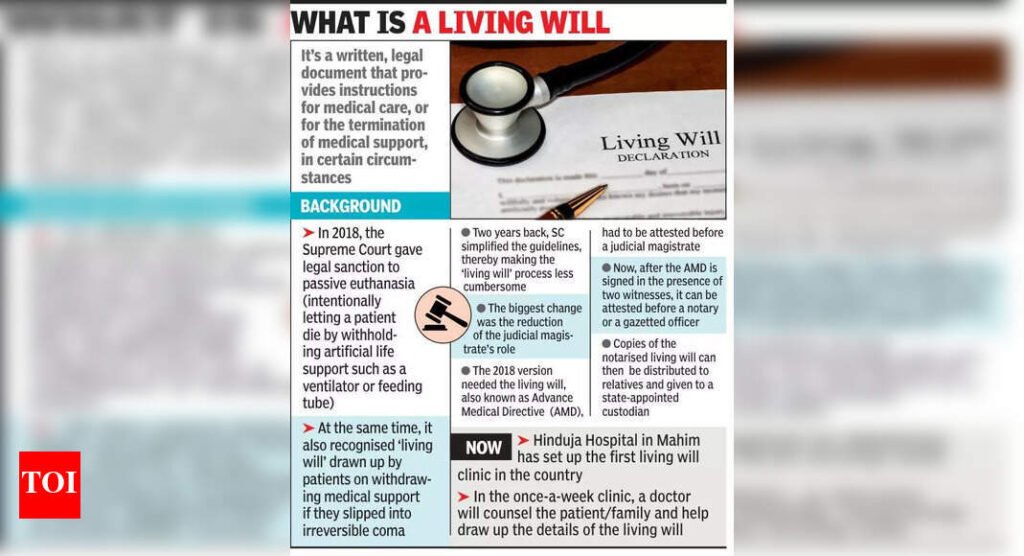Mumbai: Although India recognised the living will through a landmark Supreme Court judgment in 2018, many remain uncertain about how to go about the process. To address this, a local hospital has established a weekly clinic to help patients and families prepare this legal document.Hinduja Hospital in Mahim began the living will clinic last week, with the involvement of senior neurologist Dr Roopkumar Gursahani, who has been actively associated with the ‘dying with dignity’ movement for over a decade.The clinic’s presence could improve public knowledge and encourage more people to prepare living will, said palliative care specialist Dr Smriti Khanna, who manages the clinic.Palliative care specialist Dr Smriti Khanna, who manages the clinic, said, “The courts presented the simplified version of the living will in 2023, but many are still not aware of it.”Living wills, or an advanced life directive, allow people to specify their medical care preferences and conditions for discontinuing life support. People can specify whether or not they want to be resuscitated or be hooked up to a ventilator in case of any adverse development.In early 2024, city gynaecologist Dr Nikhil Datar became one of the first few to register his living will. He then moved the Bombay High Court, which directed the state to appoint custodians for the living will in each district.Maharashtra now has 413 custodians, including two in Mumbai. “The govt resolution in this regard is available, but many people are unaware of how to access this GR. There is now a need to ensure information about living wills and the govt-appointed custodians is widely available,” said Dr Datar.The Hinduja clinic will work on improving public literacy in this regard, said Dr Gursahani. He identifies three primary groups seeking living will services: young, healthy individuals concerned about vegetative states; people in their sixties or seventies who have recently suffered a health setback and understand mortality; and those with a chronic disease needing palliative care.“The availability of the living will has normalised end-of-life discussion among those seeking palliative care,” said Dr Khanna. People worry about getting into intensive care units as they are unaware of what this entails. “But when I discuss ventilators or the need for a central line with them, they realise the parameters that ICU care involves. This helps them make decisions about their advanced directives. Such discussions provides them with a context,” she said.The hospital recently helped an octogenarian with chronic obstructive pulmonary disease and heart problems draw up the “parameters” for his living will. “He needed continuous oxygen support and realised that he may not have many years left, but wished to attend his granddaughter’s wedding a year later,” said Dr Gursahani. Through consultations, he decided to accept ventilator support for three to five days (to be discontinued thereafter) but declined resuscitation for heart problems, having witnessed CPR complications in another patient.The Hinduja clinic operates on Saturdays by appointment, offering counselling and assistance in drafting living wills. After notarisation with two witnesses, copies are distributed to custodians, relatives, and healthcare providers. The clinic plans to publish process guidelines and draft templates online.Meanwhile, the state govt has a deadline of mid-August to set up a portal for living wills. “This was the high court’s directive,” said Dr Datar, who envisages a website that would work like a marriage registration system.


